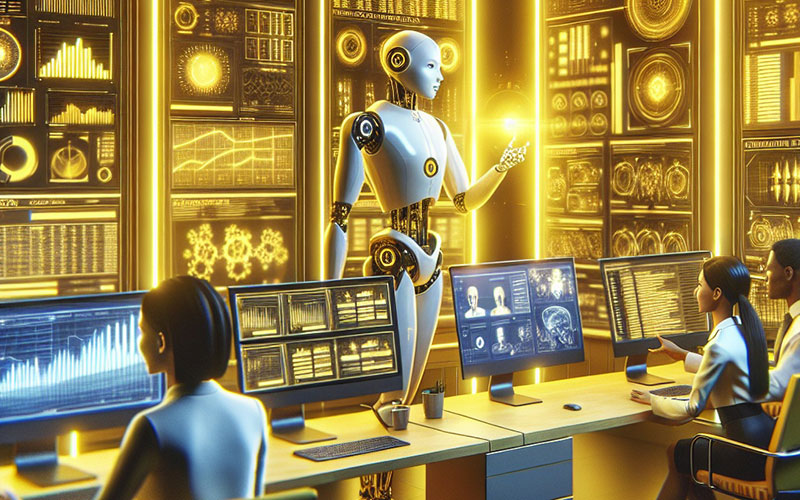In an era defined by rapid technological advancements, the question looms large: will AI replace tax preparers? For CPAs and tax professionals, this query sparks both curiosity and concern. While AI-powered tools have undeniably transformed the tax landscape, their role in reshaping the profession is a topic of ongoing debate. In this article, we’ll delve into the benefits of AI-powered tools for tax professionals, examine the current state of this technology in the industry, and explore the nuanced relationship between AI and human expertise in the realm of taxation.
The Benefits of AI-Powered Tools: Enhancing Efficiency and Accuracy
AI-powered tax preparation tools offer a myriad of benefits for CPAs and tax professionals. At the forefront is the unparalleled efficiency they bring to the table. With features like keyword search, predictive analytics, and automated data processing, these tools streamline tedious tasks and expedite the tax preparation process. CPAs can leverage AI algorithms to sift through vast troves of data, identify relevant information, and generate accurate reports in a fraction of the time it would take manually.
Moreover, AI-powered tools excel in ensuring accuracy—a cornerstone of the tax profession. By leveraging machine learning algorithms, these tools minimize errors and discrepancies, thereby mitigating compliance risks and enhancing client satisfaction. From calculating deductions and credits to flagging potential audit triggers, AI-powered tools provide invaluable support for tax professionals striving for precision and reliability in their work.
The Current State of AI in the Tax Industry: Evolution and Adoption
The adoption of AI-powered tools in the tax industry has witnessed steady growth in recent years. From multinational accounting firms to solo practitioners, tax professionals across the board are embracing technology to stay competitive in an increasingly digitized landscape. Key players in the industry are investing heavily in AI research and development, driving innovation and pushing the boundaries of what’s possible in tax preparation and compliance.
Today, AI-powered tools encompass a wide range of functionalities tailored to the needs of tax professionals. These include advanced tax research platforms with predictive search capabilities, automated data extraction tools for document analysis, and AI-driven tax compliance software for seamless filing and reporting. Moreover, the integration of AI with other emerging technologies like blockchain and natural language processing (NLP) holds the promise of further revolutionizing the tax industry, unlocking new possibilities for efficiency, transparency, and insights.
Despite the undeniable benefits of AI, its widespread adoption in the tax industry is not without challenges. Concerns surrounding data privacy, cybersecurity, and ethical implications loom large, prompting tax professionals to tread cautiously in their embrace of AI-powered tools. Moreover, the rapid pace of technological change requires tax professionals to adapt continuously, keeping pace with evolving trends and innovations to remain relevant in a competitive landscape.

Navigating the Future: AI as a Partner, Not a Replacement
As the debate over AI replacing tax preparers rages on, it’s crucial to recognize that AI is not a panacea but a tool—a powerful ally in the hands of skilled professionals. While AI-powered tools can automate routine tasks and enhance efficiency, they cannot replicate the nuanced judgment, critical thinking, and interpersonal skills that define the human aspect of tax preparation. CPAs and tax professionals bring to the table a wealth of expertise, insights, and client relationships that are irreplaceable by AI.
Instead of viewing AI as a threat, tax professionals should embrace it as a complement to their skill set, empowering them to deliver better outcomes for their clients. By leveraging AI-powered tools, tax professionals can focus their time and energy on high-value tasks like strategic planning, advisory services, and client engagement—areas where human judgment and empathy are indispensable.
Moreover, the symbiotic relationship between AI and human expertise holds the potential to redefine the future of taxation. By harnessing the collective intelligence of man and machine, tax professionals can unlock new avenues for innovation, creativity, and value creation, driving positive change in the industry.
Final Thoughts on “Will AI replace tax preparers?”
In the quest to navigate the future of taxation, one question looms large: will AI replace tax preparers? While the rise of AI-powered tools has undoubtedly reshaped the tax landscape, the answer is more nuanced than a simple yes or no. AI offers unparalleled benefits in terms of efficiency, accuracy, and innovation, empowering tax professionals to deliver better outcomes for their clients.
However, AI is not a replacement for human expertise but a partner—a tool that amplifies the capabilities of skilled professionals. As CPAs and tax professionals embrace AI-powered tools, they must tread cautiously, mindful of the ethical, legal, and societal implications of technological change. By harnessing the collective intelligence of man and machine, tax professionals can chart a course towards a future where innovation, collaboration, and human ingenuity drive positive change in the tax industry.
Stay Up-to-Date
Sign up for our newsletter to stay up-to-date with the recent advancements in technology in your industry.
